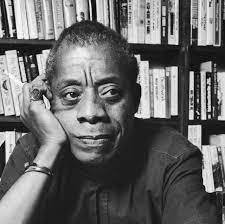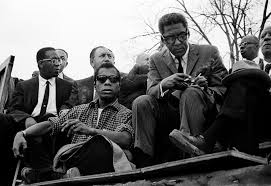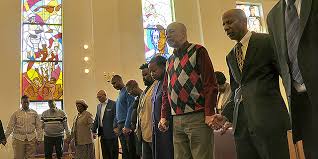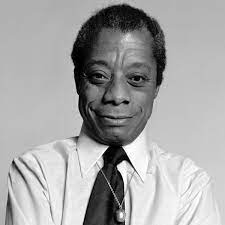Tag Archives: Race
Happy Belated Birthday James Baldwin: How My Favorite Social Critic Led Me Down an Uncertain Path
I will tell you the truth. So many of my judgments regarding what is morally correct and immoral flow from my rearing within what I like to call an authentically Black family. In many ways, that is a cute way of saying that although we loved each other through and through, there was so much diversity regarding our appearance, priorities, and life aspirations.
Please make no mistake about it; we were an eclectic bunch whose viewpoints were forged by our individual relationships with Islam (Sunni, Shia, Nation of Islam), Bahia, and Christianity (Baptist and C.O.G.I.C.). Despite having such a different basis of faith and belief in God, we all somehow agreed that homosexuality was a mortal sin.

The stern message that I received from my family and my University employers at a later date was never to acknowledge nor address the issue of homosexuality. I did my best to hold that line.
And then I met James Baldwin.
My exposure to Jimmy Baldwin, who I maintain to this day is the foremost social critic this nation has ever produced, began while pursuing a degree in African-American Studies at THE Ohio State University raised a host of questions for me.
- Did my adoration of Baldwin’s writings make me a hypocrite as I refused to embrace others who chose a different lifestyle?
- Was I complicit in the oppression of a segment of Black America by not speaking up for them?
- Was it possible to love Baldwin and be repulsed by the rest?

Tonight MRCi discussion will cover this issue of Black men and their relationship/view of Black male homosexuals. Although a risky topic, I think that our intellectual community will be able to handle it. As always, you are welcome to join us as we delve into what many still believe is a taboo subject matter among Black men.
MRCi discussions occur every Thursday @ 7:30 (EST) – 6:30 (CST). Click on the link below to join our intellectual community.
Join us as we discuss pressing matters facing and impacting Black Men and Black America.
If you can not get the link to work, use the information to join the Zoom session.
Meeting ID: 353 334 8869
Passcode: 1YF4BG
James Thomas Jones III, Ph.D.
©Manhood, Race, and Culture, 2021
THE CASE FOR AFRICAN-AMERICAN MALE STUDIES
This is a Manhood, Race, and Culture Interactive (MRCi) discussion. The panelists are discussing if there is a need for African-American Male Studies and the plight of Black men.
MRCi discussions occur every Thursday @ 7:30 (EST) – 6:30 (CST). Click on the link below to join our intellectual community.
Join us as we discuss pressing matters facing and impacting Black Men and Black America.
Just in case you can not get the link to work, use the information to join the Zoom session.
Meeting ID: 353 334 8869
Passcode: 1YF4BG
No Reported Income?: The Dire Economic Plight of so many Black Millennials and How We Can Address It
One of the most repetitious yet bemusing moments that repeats itself in my courses occurs after I cover the indispensable contributions of Civil Rights attorney Charles Hamilton Houston’s fight for racial equality. Despite common misconceptions, Houston, not his protégé Thurgood Marshall, matters most mightily in the buildup to the historic Brown v. Board of Education (1954 & 1955) decision. The Supreme Court decision began the process of ending racial segregation in American schools.

The historical record indicates that in the decade following Brown, American institutions (schools, businesses, colleges, etc.) took small steps toward relinquishing many of the vestiges of American-style apartheid. Unfortunately, for the sake of truth, the damage done to Black America’s economic infrastructure as a result of desegregation is rarely discussed. The historical record indicates that Civil Rights leaders shortsightedness relegated Black America to economic subservience.
The consequences of moderate Civil Rights leaders’ decision to exclude Nationalist voices calling for economic self-reliance are impacting us to this moment.
One needs to look no further than the present economic plight of many Blacks for verification of this assertion. The dire economic prospects of a significant portion of Black America demonstrate how important it is for Black America to possess the ability to employ themselves by circulating the dollar amongst themselves. Consider for a moment that recent U.S. Census data indicates that 973,209 millennial Black men have no reported income. I am confident that with the damage that the Black Male brand has undergone over the past decades, many will shake their head at this information and say, “the brothers have got to do better.” Yet this is not a problem exclusive to Black men. The same Census data reports that the plight of millennial Black women is not much better as 707,625 of them are in the same predicament.

The above data would not be as devastating if America were not a Capitalist nation. Even the Wu-Tang Clan told all within earshot that Cash Rules Everything Around Me (C.R.E.A.M). There is no room for a reasonable debate that within Capitalist America, those who possess money wield absolute power over the economically marginalized.
What makes this reality more dangerous for Black men is the relatively standard demand that others expect them to occupy the role of the primary provider in their household. If financial stability is a prerequisite to having a family, the absence of a reliable, substantial income has banished 973,209 millennial Black males to the realm of being inconsequential in Black America’s advancement. Let’s be honest about this matter; the inability of the aforementioned Black men to access capital through “legitimate” means weakens Black America today. It curtails its future potential because Black family’s matter mightily.

When one considers the myriad obstacles, particularly previous entanglement with the American criminal justice system, that stand between Black men and gainful employment, it is time that Black America busies itself developing entrepreneurs and small business owners. The historical record indicates that any reliance on Whites to employ the “hardcore unemployable” in our midst is bound to fail miserably. Turn inward, my people, develop businesses and patronize them as if your life depends on it because it does.
James Thomas Jones III, Ph.D.
©Manhood, Race, and Culture, 2021
The Unforeseen Political and Economic Ramifications of Blacks Swirling their Racial Identity
Truthfully, I can’t pinpoint where my belief that self-conception is crucial to politico-economic allegiance began. It could be that politicized parents raised me. Maybe it was reading Marcus “Mosiah” Garvey and W.E.B. DuBois’ calls for Black folk to turn inward and take care of their own, or perhaps it was my grandfathers’ examples as “race men.” My belief that self-conception is a significant factor in politico-economic allegiance will never change.
The above statement is why I find US Census data indicating increasing diversity in how they self-identify so concerning. Census reports report that those reporting themselves as only “Black or African American” have declined over the past two decades from the 2000 US Census. In 2000, 93% of people self-identified as Black. Nearly two decades later (2019), that number dropped to 87% of people reporting as Black or African American, non-Hispanic. In the 2019 Census, 3.7 million (8%) reported as Black and another race, usually White, while 5% self-identified as Black Hispanic.

In a world where there is strength in numbers, the decision of some Black folks to swirl their racial identity is troubling as it signifies a shift in self-conception, the most significant factor in where one’s politico-economic loyalties rest. Now let’s be clear about this matter; I do not deny that the DNA of other races courses through the veins of Blacks; one needs to look no further than the various hues and colors that adorn our beautiful people for verification. Of course, this process began with the rape of stolen African women forcibly deposited in the Caribbean, Brazil, North American continent, and all points in-between by a host of European exploiters.
This already diverse supply of stolen Africans produced a unique cultural identity that facilitated their loose agreement that they were neither African nor European; they were Black. A term that surpasses being a mere descriptor and has transitioned into a political statement.
In time, SNCC organizer Willie “Mukasa” Ricks would mesmerize young Black activists by debuting a Black Power slogan in Greenwood, Mississippi, during the continuation of James Meredith’s March Against Fear. Radicalized segments of our community have always rallied around Blackness. Please do not think that I am unaware of the propensity of some twentieth-century Blacks to exoticize their Blackness by claiming a distant Cherokee grandmother whose DNA contribution explains why they have “good hair.” Yet, even they understood that they were Black, and that’s where their politico-economic allegiance laid. Even the most exoticized Blacks with hazel or blue eyes, fair skin, and flowing locs understood that they remained inextricably linked with other Blacks.
This new millennium effort to self-identify as something other than Black seems much different from prior attempts by Blacks to differentiate themselves. While so many groups appear to be doubling down on their political identity, there is a segment of Black folks that are desperately running from identifying with their kind and thereby forfeiting potential political and economic gains that only come through racial solidarity.
In a land where numbers matter regarding political power and the development of economic might, this secession movement threatens to weaken Black America in unprecedented ways. One can only wonder where this illogical migration away from Blackness by persons that will always be seen as Black by those they desperately seek to join will end.
James Thomas Jones III, Ph.D.
©Manhood, Race, and Culture, 2021

